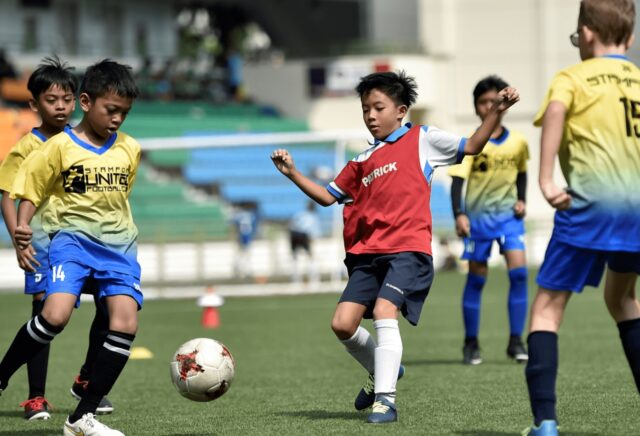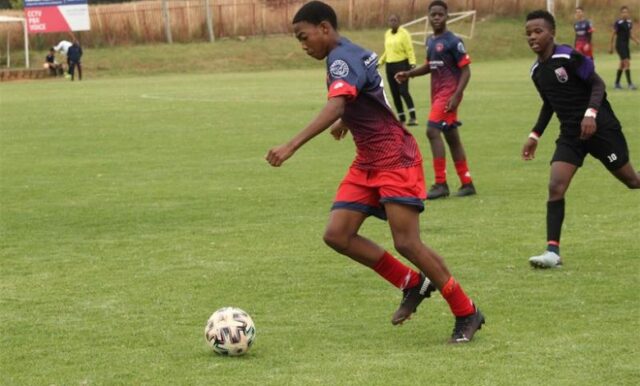
Youth football development is a crucial aspect of the sporting world, serving as the foundation for producing the next generation of talented football players. The journey from a budding youngster to a professional athlete requires not only innate talent but also a structured and supportive environment that fosters growth, learning, and resilience.
In this blog, we’ll delve into the key components of youth football development, exploring the significance of early training, the role of coaches and parents, and the impact of a holistic approach in shaping young athletes.

Early Development and Fundamental Skills
The early years of a child’s engagement with football play a pivotal role in shaping their future in the sport. At this stage, it’s less about competition and more about instilling a love for the game and developing fundamental skills. Coaches in youth football programs should focus on fostering a positive and enjoyable experience that encourages youngsters to fall in love with the sport.
Basic skills such as dribbling, passing, shooting, and ball control lay the foundation for a player’s future success. These skills, when ingrained at a young age, become second nature as players progress through the ranks. Youth football programs should emphasize a balanced approach, ensuring that technical skills are coupled with physical fitness, agility, and coordination exercises.
Coaching Philosophy and Mentorship
The role of coaches in youth football development cannot be overstated. A positive coaching philosophy at FPRO™ that prioritizes individual growth, teamwork, and sportsmanship is essential. FPRO™ is an app that is designed to help football (soccer) players of all levels improve their ball mastery skills through a gamified training experience.
Coaches should act as mentors, guiding young players through both the triumphs and challenges of the game. Building confidence and resilience is as important as teaching tactical strategies.
Furthermore, effective communication is key. Coaches need to convey instructions in a manner that is easily understood by young minds. A supportive and encouraging environment fosters a love for learning and improvement, making the football journey enjoyable for young players.
Mentorship extends beyond the pitch, involving the development of life skills such as discipline, teamwork, and time management. Responsible coaching goes beyond creating great footballers; it shapes well-rounded individuals who can thrive both on and off the field.

Parental Involvement and Support
Parents play a crucial role in youth football development. Their involvement goes beyond cheering from the sidelines. Parents need to support their children emotionally, reinforcing a positive attitude towards the game. Understanding the importance of the learning process, regardless of the outcome, is vital.
Encouraging a balance between academics and sports is also essential. A supportive home environment allows young athletes to pursue their passion for football without compromising their overall development. Additionally, parents can act as advocates for positive sportsmanship, emphasizing the importance of fair play and respect for opponents, officials, and teammates.
Facilities and Infrastructure
Access to quality facilities and infrastructure is integral to youth football development. Well-maintained pitches, training equipment, and fitness facilities contribute to the overall development of young players. Investments in infrastructure not only create a conducive environment for learning but also signal a commitment to the growth of football at the grassroots level.
Community involvement and collaboration with local schools, clubs, and municipalities can enhance the availability and quality of football facilities. Developing a sense of community around the sport fosters a supportive network that benefits aspiring young players.

Tournaments and Exposure
Participation in tournaments and exposure to competitive play are essential components of youth football development. Tournaments provide young players with the opportunity to test their skills against diverse opponents, fostering a competitive spirit while also exposing them to different playing styles.
Additionally, exposure to scouting and recruitment processes can open doors for talented young players. Local, regional, and national tournaments serve as platforms for scouts and talent identification programs, offering a pathway for gifted youngsters to progress to higher levels of competition.
Balancing Competition and Development
While competition is crucial for growth, striking a balance between winning and learning is paramount in youth football development. Emphasizing development over immediate results allows coaches to focus on refining players’ skills and instilling a love for continuous improvement.
A holistic approach to player development recognizes that success in youth football is not solely measured by match outcomes but also by the progress and growth of individual players. Coaches, parents, and players should understand that setbacks and defeats are part of the learning process, providing valuable lessons that contribute to long-term success.

Integration of Sports Science
The integration of sports science into youth football programs has become increasingly important. Understanding the physiological and psychological aspects of young athletes aids in designing training regimens that optimize performance and minimize the risk of injuries.
Sports science encompasses elements such as nutrition, strength and conditioning, recovery strategies, and mental well-being. Incorporating these aspects into youth football development programs not only enhances the physical capabilities of players but also instills habits that contribute to their overall health and longevity in the sport.
Social and Cultural Awareness
Youth football development goes beyond the technical and physical aspects of the game; it also involves fostering social and cultural awareness. Football is a global sport that transcends borders and cultures. Embracing diversity and promoting inclusivity within youth programs enriches the overall experience for young players.
Educational initiatives on cultural sensitivity, inclusivity, and anti-discrimination should be integrated into youth football development programs. This not only prepares players for the diverse landscape of professional football but also contributes to the broader goal of creating responsible and empathetic individuals.
End Note
In conclusion, youth football development is a multifaceted process that goes beyond the confines of the football pitch. It involves nurturing talent, instilling a love for the game, and shaping well-rounded individuals who can navigate the challenges of both sport and life. Coaches, parents, facilities, and communities all play integral roles in creating an environment that fosters the next generation of football talent. By embracing a holistic approach that prioritizes skill development, mentorship, and a positive mindset, we can ensure that young players not only succeed on the field but also thrive as individuals in the broader tapestry of life.









